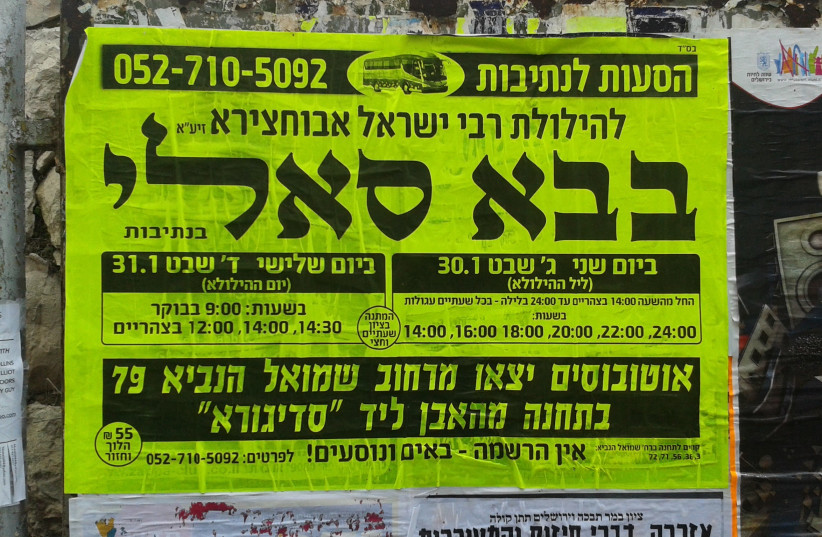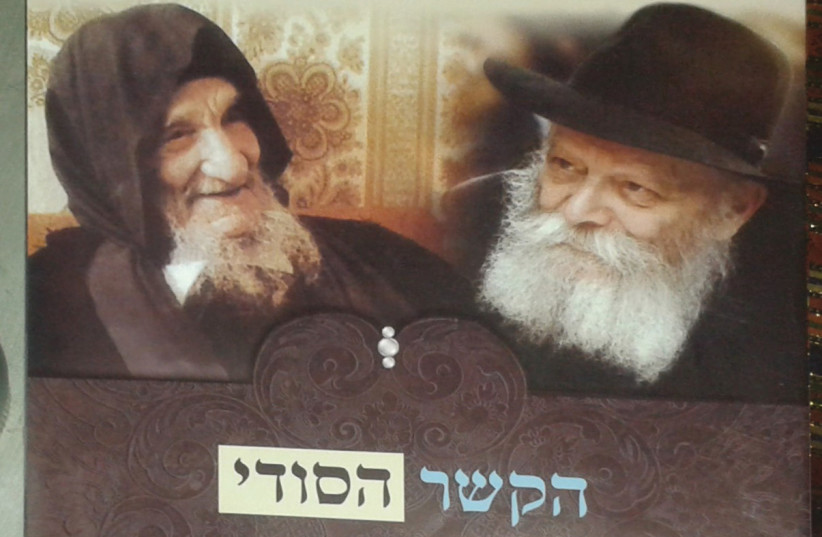Following the disastrous mismanagement of the hilula (death anniversary) of Rabbi Shimon bar Yochai in Meron last April 30, in which 45 pious Jews were crushed to death in a stampede and countless others exposed to the coronavirus, there was only one reasonable course for the government to follow in advance of last week’s planned mass celebration at the tomb of the Baba Sali in Netivot – cancel it.
And then flip-flop.
Saying caution was the best policy, initially Brig. Gen. Nachshon Nagler – the police commander of the Negev region – ordered that this year’s hilula (literally “merrymaking”) for the miracle worker Israel Abuhatzeira, popularly called the Baba Sali (literally “Praying Father”), not take place.
But Rabbi Baruch Abuhatzeira, also known as Baba Baruch, the Moroccan-born kabbalist and son of the Baba Sali who manages his late father’s mausoleum, strongly objected to canceling the annual assembly, which in previous years drew 100,000 faithful.
Right-wing and haredi politicians, including Shas MK Ya’acov Margi and Religious Zionist Party leader MK Bezalel Smotrich, were highly critical of Nagler’s order.

Following pressure from the lawmakers, and a field tour in the blue-collar Negev city on December 30 led by Peretz Amar, the Southern District police commander, who was accompanied by Netivot Mayor Yehiel Zohar, representatives of the Baba Sali Association and representatives of the Fire Authority and Magen David Adom, the ban was lifted – sort of. The crowds of pilgrims would be capped at 30,000 and all but family would be restricted to staying outside the tomb itself. The building can house 300.
Interior Minister Ayelet Shaked then transferred NIS 700,000 to the Netivot Municipality to enable the police and fire department-ordered safety arrangements. The compromise allowed the 38th anniversary hilula of the revered sage (1889-1984) to go ahead last Wednesday and Thursday, January 5-6 (Shvat 4, 5782).
An estimated 25,000 pilgrims – a quarter the size of throngs in pre-COVID times – flocked here to celebrate the death and life of the mystic and scholar affectionately known in Judeo-Arabic as Sidna Baba Sali – Our Master Papa Issy.
No one without a Green Pass was permitted inside the perimeter fence. Only family members were allowed inside the complex itself. Those praying there were reminded by loud-speaker to “please pray and leave” after seven minutes.
Police arrested 12 would-be pilgrims for disturbing the peace. A news clip on KAN showed unruly visitors – refused entry because they could not produce a COVID pass – attacking police officers and security guards.
“The paranoia was exaggerated,” said Dror Efrati, who noted there were only a few hundred people present Wednesday night when he was there.
The Arutz 2000 Internet station broadcast a two-hour special on the event. A half-empty bottle of Babi Sali arak was clearly visible on the broadcaster’s desk.
This year’s celebration was greatly subdued compared to pre-COVID times – when visitors would drink copious amounts of fiery arak, eat kebabs stuffed into baguettes, consume cotton candy, buy toys and religious souvenirs from the site’s temporary market, and ritually throw packages of memorial candles into a bonfire. This year there was neither the temporary fair nor the bonfire.
As always, the joyous pilgrims prayed for an elevation of the Baba Sali’s soul in heaven. Overcome with religious fervor, many clamored to reach his fenced-off tomb beseeching the legendary faith healer for their recovery from sickness.
“There are all kinds of Jews here – Sephardi and Ashkenazi, secular and religious, haredi and religious Zionist. And everybody gets along,” said Eliyahu McLean, born in California, who lived in Netivot for the last five years but now lives in Harish. “It’s in the merit of the Baba Sali and all the other great rabbis buried here that we get along so well.
“The place has a special character. It’s special to experience the splendor of the living Moroccan- and Tunisian-Jewish heritage. It’s a central aspect of life in Netivot. The Baba Sali is the most famous, but many of the synagogues and communities in Netivot are centered around the religious legacy of the many tzadikim who lived in North Africa.”
SCORES OF apocryphal stories circulate about the Baba Sali’s supernatural powers. By one account, the rabbi placed a drop of water in the mouth of a comatose man considered beyond help by his doctors. The man immediately opened his eyes and soon recovered.
According to another story, the Baba Sali blessed a bottle from which arak was poured all day for hundreds of visitors without becoming empty. Another anecdote relates the sage healed a soldier severely wounded in the 1973 Yom Kippur War who was about to have his legs amputated.
In the same vein, the Baba Sali’s grandfather Rabbi Yaakov Abuhatzeira (1806–1880) – also known as the Abir Yaakov and Abu Hasira – fell ill in Egypt while en route from Morocco to the Holy Land. He asked to be buried where he was dying, in the village of Damityo, 3 km. south of the Nile delta city of Damanhur, rather than be interred in Alexandria’s Jewish cemetery. Some Jews connect Abuhatzeira’s merit with the Allies’ victory over Field Marshall Erwin Rommel’s Afrika Korps in 1942 during World War II’s pivotal Battle of El Alamein.
While for decades following independence Israel was bifurcated along ethnic lines between its Ashkenazi Eastern European founding generation and the 1.5 million Oriental (Middle Eastern) Jewish refugees who came in the two decades following independence, the pilgrims to Netivot represent all religious and ethnic streams. Photoshopped posters place Lubavitcher Rebbe Rabbi Menachem Mendel Schneerson (1902-1994), alongside the Baba Sali – although the two never met in life. Schneerson, born in Ukraine then in the Tsarist Empire but who lived for much of his life in Brooklyn, is considered one of the most influential Ashkenazi leaders of the 20th century.

Parallel to the celebration in Netivot, a hilula was held last Wednesday (January 5) in Brooklyn at the Merkaz Sefarad Chabad, under the leadership of Rabbi Eliezer Avtzon and sponsored by Rabbi Hirshel and Mrs. Annette Lipsker and their children and grandchildren.
Mrs. Lipsker and her sister, Chaya Zaetz, are descendants of the Abir Yaakov, grandfather to the Baba Sali.
The evening featured a live hook-up with Netivot. In both places, traditional Moroccan foods were served, together with live music and singing led by paytanim (singers of liturgical music).
Apart from Chabad Hassidim, groups of Breslover Hassidim were raucously dancing at the celebration. Also present were Ethiopian Jews, some of whom settled in Netivot following the 1991 Operation Solomon, which brought 14,325 Jews from the Horn of Africa in a 36-hour rescue evacuation. Besides Netivot, many were settled in nearby southern cities including Gedera, Kiryat Gat, Yavne, Beersheba, Beit Shemesh, Ashkelon and Rishon Lezion.
Abuhatzeira was the scion of a leading rabbinical family in Tafilalt, Morocco – an oasis in the Sahara Desert along the caravan route from the Niger River to Tangier. He immigrated to Israel in 1959. Like many Sephardi Jews who flooded Israel in the years after its establishment, he was settled in a remote development town in the Negev Desert.
Abuhatzeira was directed to Netivot, then a three-year-old ramshackle slum 12 km. east of the Gaza Strip. There he secluded himself in his home, where his disciples would gather to receive his blessing, especially for healing. Today, Netivot has evolved into a modern city of 35,000 linked by a railroad to Tel Aviv and Beersheba, on the train line that joins it with the other nearby former development towns of Ofakim and Sderot.
The Baba Sali’s white-domed neo-Moorish mausoleum, located in a park and palm forest developed by the Jewish National Fund, is a magnet for some 800,000 visitors annually. The most popular day is the hilula, observed on Shvat 4.
The Baba Sali’s son Baruch Abuhatzeira entered politics and was elected deputy mayor of Ashkelon. While he was subsequently tried and sentenced to five years imprisonment for corruption and bribery, that jail term didn’t besmirch his father’s status. Released early, Abuhatzeira joined the Baba Sali during the last three months of the saint’s life.
